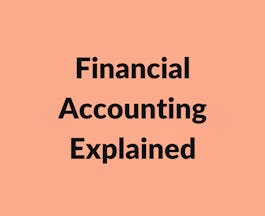Filter by
The language used throughout the course, in both instruction and assessments.
Explore the Trading Course Catalog


University of Pennsylvania
Skills you'll gain: Financial Statements, Financial Statement Analysis, Financial Accounting, Financial Reporting, Income Statement, Cash Flows, Balance Sheet, Financial Analysis, Accrual Accounting, Generally Accepted Accounting Principles (GAAP), Revenue Recognition


Coursera Project Network
Skills you'll gain: Financial Reporting, Financial Statements, Accounting Software, Financial Accounting, Financial Statement Analysis, Accounting, Generally Accepted Accounting Principles (GAAP), Balance Sheet, Income Statement


Indian School of Business
Skills you'll gain: Financial Statements, Financial Statement Analysis, Portfolio Management, Income Statement, Balance Sheet, Investments, Securities Trading, Financial Trading, Cash Flows, Financial Market, Risk Management, Entrepreneurial Finance, Equities, Business Mathematics, Market Dynamics


Yonsei University
Skills you'll gain: Financial Analysis, Financial Statements, Financial Modeling, Financial Forecasting, Income Statement, Balance Sheet, Financial Planning, Cash Flows, Business Valuation, Business Planning


Corporate Finance Institute
Skills you'll gain: Capital Markets, Financial Market, Investment Banking, Securities (Finance), Securities Trading, Investments, Brokerage, Finance, Private Equity, Sales, Investment Management, Portfolio Management, Market Dynamics, Asset Management


Corporate Finance Institute
Skills you'll gain: Star Schema, Data Modeling, Tableau Software, Interactive Data Visualization, Business Intelligence, Extract, Transform, Load, Dashboard, Performance Tuning, Technical Analysis, Database Design, Data Visualization Software, Data Manipulation, Market Data, Investment Banking, Exploratory Data Analysis, Tree Maps, Financial Trading, Data Integration, Key Performance Indicators (KPIs), Trend Analysis


University of Illinois Urbana-Champaign
Skills you'll gain: Financial Forecasting, Financial Statement Analysis, Business Valuation, Financial Statements, Financial Reporting, Cash Flow Forecasting, Financial Analysis, Financial Modeling, Balance Sheet, Generally Accepted Accounting Principles (GAAP), Income Statement, Trend Analysis, Corporate Finance


Interactive Brokers
Skills you'll gain: Investments, Portfolio Management, Risk Management, Equities, Market Trend, Financial Analysis, Performance Analysis, Stock Rotation, Business Economics, Market Dynamics, Market Analysis


Technical University of Munich (TUM)
Skills you'll gain: Income Statement, Inventory Accounting, Profit and Loss (P&L) Management, Cost Accounting, Gross Profit, Management Accounting, Financial Accounting, Financial Statements, Inventory Management System, Operating Expense


Rice University
Skills you'll gain: Financial Statements, Financial Accounting, Cash Flows, Financial Statement Analysis, Accounting, Accruals, Balance Sheet, Income Statement, Bookkeeping, Accrual Accounting, General Ledger, Equities


University of Illinois Urbana-Champaign
Skills you'll gain: Descriptive Statistics, Statistical Inference, Sampling (Statistics), Data Analysis, Probability & Statistics, Data Presentation, Statistical Analysis, Quantitative Research, Microsoft Excel, Exploratory Data Analysis, Statistical Visualization, Probability Distribution


Yonsei University
Skills you'll gain: Financial Statements, Financial Statement Analysis, Business Valuation, Income Statement, Entrepreneurial Finance, Balance Sheet, Cash Flows, Financial Analysis, Financial Modeling, Business Metrics, Financial Forecasting
In summary, here are 10 of our most popular trading courses
- 财务会计概论(中文版): University of Pennsylvania
- Financial Accounting Explained: Coursera Project Network
- A Beginner's Guide to Investing: Indian School of Business
- Financial Analysis for Startups: Yonsei University
- Introduction to Capital Markets: Corporate Finance Institute
- Advanced Tableau: Corporate Finance Institute
- Forecasting Financial Statements & Valuation for Accountants: University of Illinois Urbana-Champaign
- Sector Investing: Interactive Brokers
- Cost Accounting: Profit and Loss Calculation: Technical University of Munich (TUM)
- Accounting for Non-Finance Professionals: Rice University










